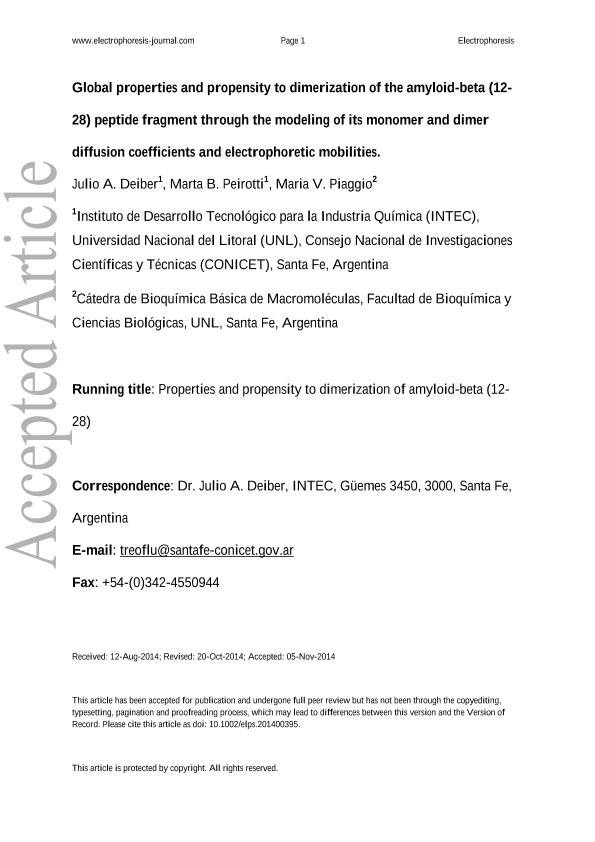Artículo
Global properties and propensity to dimerization of the amyloid-beta (12-28) peptide fragment through the modeling of its monomer and dimer diffusion coefficients and electrophoretic mobilities
Fecha de publicación:
03/2015
Editorial:
Wiley
Revista:
Electrophoresis
ISSN:
0173-0835
Idioma:
Inglés
Tipo de recurso:
Artículo publicado
Clasificación temática:
Resumen
Neuronal activity loss may be due to toxicity caused mainly by amyloid-beta (1–40) and (1–42) peptides forming soluble oligomers. Here the amyloid-beta (12–28) peptide fragment (monomer) and its dimer are characterized at low pH through the modeling of their diffusion coefficients and effective electrophoretic mobilities. Translational diffusion coefficient experimental values of monomer and dimer analogs of this peptide fragment and monomer and dimer mixtures at thermodynamic equilibrium are used as reported in the literature for different monomer initial concentrations. The resulting electrokinetic and hydrodynamic global properties are employed to evaluate the amyloid-beta (12–28) peptide fragment propensity to dimerization through a thermodynamic theoretical framework. Therefore equilibrium constants are considered at pH 2.9 to elucidate one of the amyloidogenic mechanisms involving the central hydrophobic region LVFFA of the peptide spanning residues 17–21 associated with phenylalanine at positions 19 and 20 in the amino acid sequence of amyloid-beta peptides. An analysis demonstrating that peptide aggregation is a concentration-dependent process is provided, where both pair and intraparticle charge regulation phenomena become relevant. It is shown that the modeling of the effective electrophoretic mobility of the amyloid-beta (12–28) peptide fragment is crucial to understand the effect of hydrophobic region LVFFA in the amyloidogenic process.
Archivos asociados
Licencia
Identificadores
Colecciones
Articulos(INTEC)
Articulos de INST.DE DES.TECNOL.PARA LA IND.QUIMICA (I)
Articulos de INST.DE DES.TECNOL.PARA LA IND.QUIMICA (I)
Citación
Deiber, Julio Alcides; Peirotti, Marta Beatriz; Piaggio, María; Global properties and propensity to dimerization of the amyloid-beta (12-28) peptide fragment through the modeling of its monomer and dimer diffusion coefficients and electrophoretic mobilities; Wiley; Electrophoresis; 36; 5; 3-2015; 805-812
Compartir
Altmétricas




